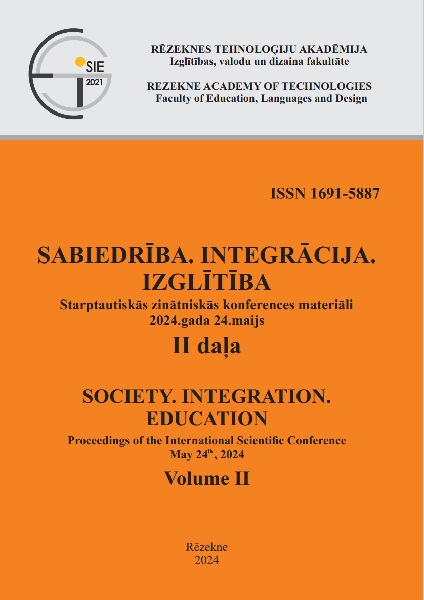THE EXPERIENCE OF TRANSFERRING AND OVERCOMING HISTORICAL TRAUMA IN SHORT STORIES: AN EXAMPLE OF JANA EGLE AND DACE VĪGANTE
DOI:
https://doi.org/10.17770/sie2024vol2.7818Keywords:
Egle, history, memory, short prose, trauma, VīganteAbstract
The article aims to evaluate and characterise the reflection of the transference of historical trauma and the perspective of overcoming it in the short stories of contemporary Latvian women. The article deals with examples of the short stories of Latvian writers Jana Egle and Dace Vīgante, highlighting the impact of historical and psychological conditions and the traumatic consequences of the heroes’ fates. The theoretical and methodological basis of the article is the theoretical studies on postcolonial criticism, cultural memory and trauma, and intergenerational communication issues by Aleida Assman, Dominick LaCapra, Laurie Vickroy, Polly Jones, Gabriele Schwab, Gayatri Chakravorty Spivak, and others.
The selected examples of Egle's and Vīgante's stories reflect the inclusion of individual stories in the collective trauma narrative. The chronotope of the historical memory in Egle’s and Vīgante’s prose forms a hard-to-exit labyrinth where the deep subconscious traumas resonate with insuperable conflicts after the Second World War and the unavoidable coincidences of circumstances. The characters have fallen not only into the historical and sociopolitical traps but also into the traps of personal traumas. Both writers highlight the limits of historical memory marked by the intersection of individual and collective memory.
References
Asmane, A. (2018). Jaunais īgnums par memoriālo kultūru. Iejaukšanās. Rīga: Zinātne.
Augustīns. (2008). Atzīšanās. Rīga: Liepnieks un Rītups.
Egle, J. (2015). Gaismā. Rīga: Latvijas Mediji.
Egle, J. (2018). Svešie jeb miļeņkij ti moj. Rīga: Latvijas Mediji.
Čakravorti-Spivaka, G. (2014). Vai pakļautie spēj runāt? Rīga: Mansards.
Jones, P. (2013). Myth, Memory, Trauma: Rethinking the Stalinist Past in the Soviet Union, 1953–70. New Haven; London: Yale University Press.
LaCapra, D. (2016). Trauma, History, Memory, Identity: what remains? History and Theory 55, October, p. 375–400.
Reulecke, J. (2008). Generation/Generationality, Generativity, and Memory. In Cultural Memory Studies (119–126). Berlin-New York, Walter de Gruyter GmbH & Co.
Schwab. G. (2010). Haunting Legacies: Violent Histories and Transgenerational Trauma. New York: Columbia University Press.
Vickroy, L. (2015). Reading Trauma Narratives: The Contemporary Novel and the Psychology of Oppression. Charlottesville. London: University of Virginia Press.
Vīgante, D. (2016a). Ledus apelsīns. Rīga: Zvaigzne ABC.
Vīgante, D. (2016b). Vienošanās nav iespējama. Pieejams: https://ir.lv/rubrika/culture/page/25/
Vīgante, D. (2018). Tad redzēs! Rīga: Zvaigzne ABC.






